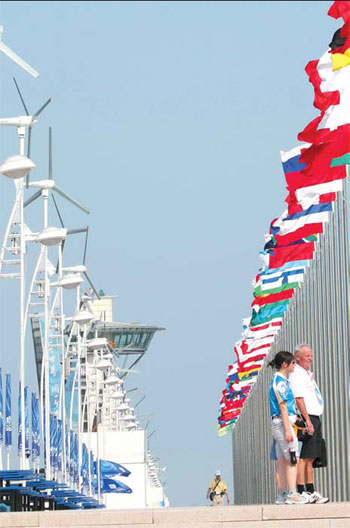Qingdao makes plans for low carbon future
The seaboard city of Qingdao in east China's Shandong province has a new low-carbon formula for the development of its economy.
"Development of a low-carbon economy is a strategic option for Qingdao's sound and sustainable development," said Xia Geng, the city's mayor.
"The following years will see Qingdao put great efforts into developing new sources of energy while reducing emissions," Xia said.
 |
|
Wind power facilities at Qingdao Olympic Sailing Center have become a major local attraction for visitors.?[China Daily] |
The city government aims to reduce carbon dioxide emissions to 1.32 tons per 10,000 yuan of gross domestic product by 2020, a decrease of 45 percent compared with 2005, according to Qingdao Development and Reform Commission.
In a bid to achieve this target, the government has incorporated low-carbon economic development into its plans for the 12th five year plan (2011-2015).
To ensure that Qingdao can achieve low-carbon economic development, any new investment projects must undergo stringent screening procedures before they can be approved. So far, 18 projects with potential heavy pollution have been turned down.
Priority is given to environmentally friendly concerns such as high-tech powered projects, the service industry, energy-saving and eco-friendly businesses and cultural enterprises.
Companies are encouraged to conduct research into developing low-carbon technologies.
The government has earmarked 127 million yuan for achieving an energy-saving economy, of which over 60 million yuan has been used on developing 70 energy efficient and low-carbon technologies. These will help save more than 300,000 tons of coal.
Several heavy energy-consuming facilities will be closed. A number of coal-fired plants have already been shut down.
While shutting down heavy polluters, renewable energy forms such as wind and solar power are encouraged.
A major new energy project is Qingdao Huawei Wind Power project, which costs 140 million yuan. Currently it generates 23.5 million kWh of electricity annually.
The total installed capacity of wind power generators in Qingdao amounts to 16.35 megawatts.
Several large-scale wind power projects are under discussion. There are plans to build four land wind power plants and two on the sea with an installed capacity of 600,000 kW.
As well as wind power, Qingdao hopes to develop solar energy. Eight percent of households use a solar-powered water heater.
The city aims to produce one million such water heaters annually so that more people will be able to use the equipment.
Solar-powered air conditioners and solar lamps are also widely used in the city. There are aims to erect solar bus shelters within three years.
Qingdao Olympic Sailing Center has a solar energy heating system that can supply hot water for showers and for the 300 sq m swimming pool. It also has a seawater air conditioning system, the first in China. This is both cheaper and greener than a traditional cooling system.
All new construction projects are encouraged to use environmentally friendly materials. The city has its first ecological building, which has special features that help to reduce emissions and energy consumption to almost zero.
Waste is another area of focus and efforts are being made to handle it in ecological ways. The annual steel residue produced by Qingdao Iron and Steel Group is re-used as building materials and the annual 180,000 tons of white liquor mud is used to desulfurize exhaust gas from coal plants.
As a coastal city, Qingdao can harness the seawater. There are several such projects underway, including a desalination plant, which can desalinate 3000 cubic meters of seawater every day.
 0
0 






